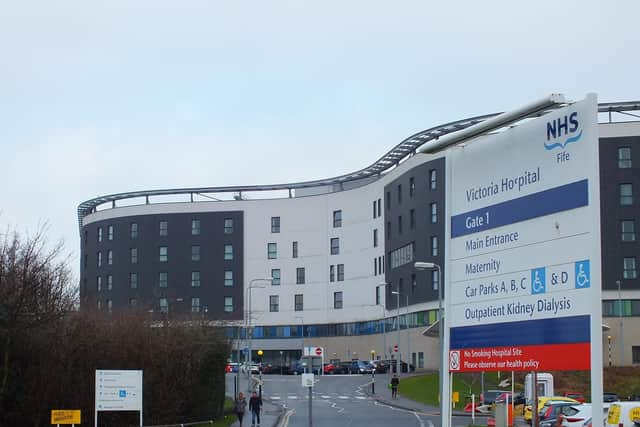Slight improvement in waiting times as NHS Fife urges people to use A&E appropriately
and live on Freeview channel 276
The latest waiting times for people attending the country’s emergency departments were published by Public Health Scotland on Tuesday.
According to the figures, 68.3 per cent of Fifers attending A&E at Kirkcaldy’s Victoria Hospital in the week up to January 7 were seen, treated, admitted or discharged within the Scottish Government’s four hour target.
Advertisement
Hide AdAdvertisement
Hide AdOf the 1335 people who attended, 912 were dealt with within the four hour time frame, while 115 (8.6 per cent) waited for over eight hours and 26 people (1.9 per cent) waited more than 12 hours.


NHS Fife’s performance was an improvement on the previous week’s figures for the week running up to Hogmanay. In that week, 66.2 per cent of people were seen within the four hours.
Claire Dobson, director of acute services for NHS Fife, said: “Our acute hospital remains incredibly busy, as we would expect over the winter months when demand is at its highest.
“While we welcome the steady improvement in waiting times over recent weeks, particularly given the rising attendances over the same period, there continues to be significant pressures on our hospitals and very high demand for inpatient care.”
Advertisement
Hide AdAdvertisement
Hide AdMs Dobson continued: “The public have a vital role to play in helping us minimise waiting times by using A&E appropriately - particularly so over winter. Attending A&E or calling 999 is only for the most serious and life-threatening emergencies, such as a severe injury, a suspected heart attack or stroke, breathing difficulties, or severe bleeding. Those who think they may need emergency care but it’s not critical or life-threatening should call NHS 24 on 111, day or night, who will help arrange the right care in the right place.”
She added that there are also four minor injuries services throughout the Kingdom where experienced and specialist clinicians can treat a range of serious injuries such as cuts and wounds, burns and scalds and broken bones.
The publication of the latest figures comes at a time when A&E departments across Scotland continue to face challenges in meeting the government’s target. For the first time since 2022, less than 60 per cent of people attending A&E in Scotland were treated, admitted or discharged within four hours. The Scottish average for the first week of 2024 saw 59.4 per cent of the 24,583 people going to A&E within the target waiting time.
Health Secretary Michael Matheson said high levels of flu and Covid alongside staff sickness was having an impact on services.
Advertisement
Hide AdAdvertisement
Hide AdHe said: “I am clear that performance remains below the levels we all wish to see and we continue to work closely with boards to support the delivery of sustained improvements.
“The heightened winter pressure being felt by our A&Es, which is not unique to Scotland, with similar challenges being felt by emergency departments throughout the UK, is being impacted by high levels of flu and Covid as well as staff sickness.
“Our winter plan is supporting boards to maximise capacity to meet demand, including expanded Hospital at Home services that are helping more people receive care at home or as close to home as possible, where clinically appropriate. This aims to relieve pressure on the front door of our A&Es.”
Mr Matheson said the Government is also working to tackle delayed discharge in hospitals.